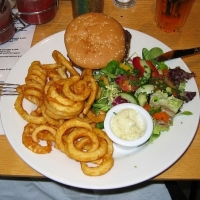3 Little Known Secrets To Reprogramming Your Body For Long Term Weight loss
There are many misconceptions about weight loss, the main ones being that to lose weight, you just have to count calories, and that the fat you eat is what makes you fatApparently diets have been shown to have a 95% failure rate over 5 years on average!In this article, we look at 3 tried, tested and proven nutritional approaches to long term weight management.
Numerous scientific studies have shown that the approaches taken by many so called weight loss diets are incomplete to say the least. Not only are they incomplete, they are also incredibly counterproductive. Indeed the body adjusts to a reduced calorie intake by lowering our metabolism, and if we decide to cut out fats, our body reacts to deficiencies in the essential fats we need by triggering cravings. Both of which drive us to accumulate further body fat as the years go by!
So what are the 3 secrets to long term, sustainable and healthy weight loss?
1. Blood sugar friendly foods
Studies have shown the successful, consistent and dependable outcomes achieved by following a low Glycaemic Load, nutrient dense way of eating.
How does it work?
Low GL only applies to carbohydrate foods. It stands for low glycaemic Load, which means 'resulting in less sugar in the blood'. To be even more precise, time is an essential factor as well, as a low GL diet avoids foods which lead to too much sugar in a short episode of time in the blood (sugar spikes). This also entails that we'll avoid sugar 'lows' as well (often a result of the spikes).
Highs and lows in blood sugar play havoc with our metabolism and end up causing us to store fat, put on weight and suffer from low energy and cravings (as well as poor concentration, irregular moods, and the list goes on...
2. Smart protein choices
Proteins are made of amino acids, the building blocks of our body, and yet our modern diet, dominated by easy to come by carbohydrates, is often lacking in them. As a rule of thumb we need approximately 1g of pure protein per Kg body weight daily, and more if exercising or pregnant (so a 70Kg person needs approximately 70g of pure protein daily).
This is why we need protein (3 reasons):
- Protein makes us feel satisfied for longer (so we're less likely to crave other foods shortly after eating)
- Protein slows down the breakdown of carbohydrates in the blood, keeping you on an even keel.
- Protein is essential in maintaining and building muscle tissue, bones and tendons. The greater our body's muscle %, the better our we are able to produce energy from glucose (and hence to burn fat). More muscle tissue increases our metabolism.
3. More plant nutrients
The '5 a day recommended daily allowance' of fruit and vegetables is really a minimum, determined in order to avoid malnutrition ailments?it is a good goal to aim for in the first instance, but more is better if you can.
These healthy nutrients are very much essential in helping our body function in the most desirable way, and a healthy body is normally good at reducing fat.
One simple rule to follow with fruit and vegetables is to try and go for a rainbow approach ?a good variety of different colours ?they all have their strong points: for example, purple tend to be rich in antioxidants, yellow in beta-carotenes, dark green are just fantastic liver supporting agents. In order to save their quality, it is best that you consume while crisp and fresh and try to prepare them with less cooking. I highly suggest stir-frying and steaming.
Aside from their richness in vitamins and minerals, fruit and vegetables provide lots of fibre, helping keep your bowels healthy and getting rid of unwanted toxins.
So the secret to long term weight loss is simple really: it's not an expensive pill, or superhuman willpower, or for that matter, a complicated diet. No.. the secret is just to nourish the body with what it needs to keep it healthy and balanced. It's valuable to keep in mind that a healthy body is naturally slender, and for this, there are no shortcuts.?
-
Raise Metabolism Lose Weight With The Best Diet Menu Available! - Fat Burning Program
CLICK HERE NOW to DOWNLOAD The Fat Burning Furnace Program and Lose 20
-
Tracking Your Weight Loss
Keeping track of your weight can be a powerful motivator for staying o
-
Simple Strategies On How To Lose Weight
-
Fat Burning Furnace - Avoid Long Cardio Workouts If You Dont Want Slow Weight Loss!
Learn How to Lose 26 Pounds in 7 Weeks! Avoid Long Cardio Workouts If
-
Every Other Day Diet Menu
Have you heard of a new method to lose weight intitled The Every Other
-
Six Winning Health Benefits of Maqui Berry
- DON'T MISS
- Diet Foods Delivered To Your Door
- Ayurvedic treatment is greatly effective in reducing weight
- Healthy weight loss cuts cancer risk (health24)
- Natural Appetite Suppressant Supplements To Reduce Body Weight Safely
- meizitang tell you eating the oil can thin
- TV Chef Cooks Up A Thinner Waistline
- 5 & 1 Meal Plan- Medifast Safe Weight Loss Program
- A Faster Metabolism at Any Age
- Meals to get rid of fats
- The Truth About The Fat Flush Diet Plan




